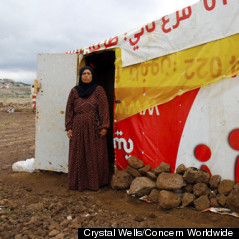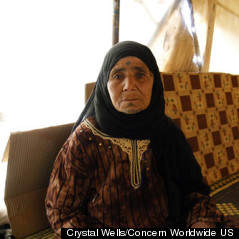Please note the names in this story have been changed to protect the identity of those interviewed.
It is olive season here in Lebanon.
In Akkar, the northernmost district in Lebanon, many of the olive orchards have been passed down from generation to generation. Fueled by September and October rains, the window for olive-picking runs from mid-October to December, a time when farmers dot the hillsides, picking and shaking olives from silvery branches.
For many of the refugees, who lost everything they owned in the war and arrived in Lebanon with close to nothing, the olive season offers a rare and precious opportunity to find work in an area where a fierce competition for jobs have made even day laborer jobs a priceless commodity.

Perched on a hillside just over a mile from the Syrian border, the small, remote village of Fraidis is home to ten refugee families who live in a former school. Since arriving in Lebanon, they have found work extremely hard to come by and many used what savings they had left to get out of Syria.
When the olive season arrived, Mohannad, 30, was offered work through the end of the season. The earnings were meager -- just a little more than $16 a day -- but with some 80,000 Syrian refugees and thousands of unemployed Lebanese competing for jobs in Lebanon's poorest district, steady, reliable income at any rate is near to winning the lottery.
But instead of setting out for work on his own every day, Mohannad did what few others in his situation would. He offered to share the opportunity with the other nine families, establishing a system in which each adult will get five to six days of work. "Everyone here is out of work," Mohannad says. "It would not have been fair for me to come home with money and food for my family while my cousins and friends could only buy bread."
Forced from their country by a war of seemingly unlimited brutality, Syrians often arrive in Lebanon having lost everything that they spent their lives trying to create. Many no longer have homes, while those who do have had all of their possessions looted. Most are living off of whatever savings they have left and any assistance they can get from the UN and humanitarian organizations like Concern Worldwide.
But remarkably, even in the face of seemingly insurmountable desolation, poverty and loss, small acts of kindness prevail in refugee communities across Lebanon, from a single mother of an adopted child who uses her sewing talents to give her neighbors fabric wall hangings to decorate their tented walls to a man who frequently sets up a small barber stand and offers free haircuts and shaves in the hallway of a former school.

For some of the most vulnerable Syrians, like Nasra, 80, and her husband, Abdul, 95, basic survival would be close to impossible without the kindness of others. Too old and frail to work, Nasra and Abdul live in a small shelter in the back of a cluster of makeshift shelters beside a road in Kweshra, an area just north of Halba, the capital of Akkar district. "There is no money," Nasra says. "Our neighbors built this shelter for us. They feed us and buy us water. We have them and God."
Just across the road, Yara, whose husband died six years ago, left Syria with her four children after her home was destroyed. She now lives beside some 30 other Syrian families and takes whatever work she can find to provide for her children as best she can on her own. She, like Nasra and Abdul, says that she relies on her neighbors to get by, who often share food with her and her children as money is so tight.
I met Yara after a night of heavy rainfall that damaged her patchwork shelter. Wassef, 28, a father of three who arrived in the informal tented settlement just days earlier, was at work building Yara a new window frame that would help keep the wind and rain out of their home.
These gestures of kindness, though small, are representative of the tight community fabric that has been stitched together in many Syrian refugee communities in Lebanon. Connected by what they experienced and lost in Syria and the struggles they face today as refugees in Lebanon, the generosity from family to family, person to person is nothing short of inspiring and remarkable given what little they have financially, let alone the intangible life factors we often take for granted, like stability.
Back at Fraidis, the olive work has tapered off, but the families say that their support for one another will continue. "We are like a big family," says Maysaa, 25, the wife of Mohannad. "None of us have the financial ability to really help one another, but we share what work and money we have."
This post is part of a series produced by The Huffington Post and the NGO alliance InterAction in celebration of #GivingTuesday, which will take place this year (2013) on December 3. The idea behind #GivingTuesday is to kickoff the holiday-giving season, in the same way that Black Friday and CyberMonday kickoff the holiday-shopping season. We'll be featuring posts from InterAction members all month in November. To see all the posts in the series, visit here; follow the conversation via #GivingTuesday and learn more here. For more information about InterAction, visit here. To see what Concern Worldwide is doing for #GivingTuesday, click here.
And if you'd like to share your own #GivingTuesday story, please send us your 500-850-word post toimpactblogs@huffingtonpost.com.
